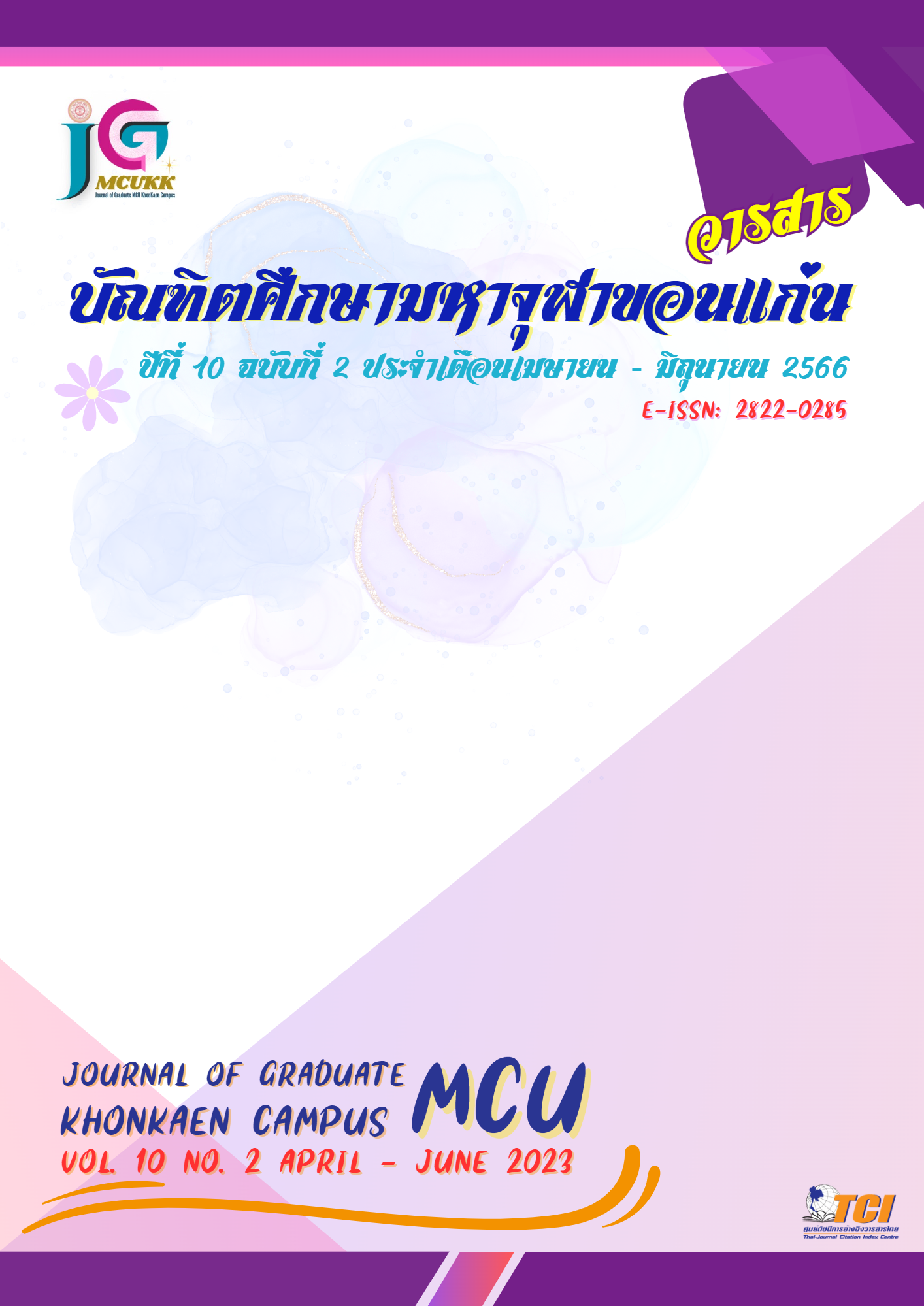การพัฒนาสุขภาพจิตตามหลักพุทธจริยศาสตร์
Main Article Content
บทคัดย่อ
การวิจัยนี้มีวัตถุประสงค์เพื่อ 1) ศึกษาการพัฒนาสุขภาพจิต 2) ศึกษาหลักพุทธจริยศาสตร์ในการพัฒนาสุขภาพจิต และ 3) วิเคราะห์การพัฒนาสุขภาพจิตตามหลักพุทธจริยศาสตร์ เป็นการวิจัยเชิงเอกสารศึกษาเอกสารปฐมภูมิจากพระไตรปิฎก เอกสารทุติยภูมิจากเอกสารวิชาการ และงานวิจัยที่เกี่ยวข้อง วิเคราะห์ข้อมูลเชิงพรรณนาตามหลักอุปนัยวิธี
ผลการวิจัยพบว่า
1. การพัฒนาสุขภาพจิต เกิดจากการเปลี่ยนแปลงสภาพปัญหาในสังคมปัจจุบันที่ส่งผลกระทบต่อสุขภาพจิต เป็นปัญหาสำคัญ และมีแนวโน้มจะรุนแรงมากขึ้น การพัฒนาสุขภาพจิตจึงมีความสำคัญเป็นอย่างยิ่งต่อการดำเนินชีวิตเพื่อให้มนุษย์ได้ยกระดับจิตให้สูงขึ้น และนำไปสู่ความเป็นผู้มีสุขภาพจิตดี ที่สามารถดำเนินชีวิตอยู่ได้ในสังคมอย่างมีความสุข
2. หลักพุทธจริยศาสตร์ที่ใช้ในการพัฒนาสุขภาพจิต ได้แก่ หลักไตรสิกขา คือ ศีล สมาธิ ปัญญา ซึ่งเป็นหลักการที่จะนำมาพัฒนา กาย จิต ปัญญา ได้อย่างสมดุล และหลักสติปัฏฐาน 4 คือ กาย เวทนา จิต ธรรม เป็นการรู้เท่าทันกระบวนการทำงานของจิต มีความตั้งมั่น แน่วแน่ มีสติ ระลึกรู้ เป็นจิตที่ดีงามเป็นข้อปฏิบัติเพื่อการรู้แจ้ง และเข้าใจตามเป็นจริงของสิ่งทั้งปวงโดยไม่ถูกกิเลสครอบงำ
3. การพัฒนาสุขภาพจิตตามหลักพุทธจริยศาสตร์ เป็นการนำหลักไตรสิกขามาพัฒนาให้เกิดคุณภาพชีวิตที่ดีงามทั้ง ศีล สมาธิ ปัญญา เพื่อความเป็นมนุษย์ที่สมบูรณ์แบบ การพัฒนาต้องอาศัยหลักสัมมาทิฏฐิเป็นแกนนำให้การพัฒนาภายในตัวบุคคลที่ยังไม่รู้ให้เกิดการเรียนรู้ และการปฏิบัติตามหลักสติปัฏฐาน 4 ถือว่าเป็นการพัฒนากาย เวทนา จิต ธรรม และสติปัญญาขั้นสูง แจ่มแจ้งด้วยปัญญา ต้องปฏิบัติควบคู่ไปกับหลักไตรสิกขา โดยมีเป้าหมายสูงสุดคือพระนิพพาน
Article Details

อนุญาตภายใต้เงื่อนไข Creative Commons Attribution-NonCommercial-NoDerivatives 4.0 International License.
เอกสารอ้างอิง
กฤษณา ศักดิ์ศรี. (2530). จิตวิทยาการศึกษา. กรุงเทพฯ: นิยมวิทยา.
บุญเรือน เฑียรทอง. (2547). ทัศนคติและความเข้าใจต่อคําสอนทางพระพุทธศาสนาที่เกี่ยวกับอริยมรรคมีองค์ 8 ของนักเรียนชั้นมัธยมศึกษาตอนปลาย : ศึกษาเฉพาะกรณี โรงเรียนโพธิสารพิทยากรเขตตลิ่งชัน กรุงเทพมหานคร. (วิทยานิพนธ์พุทธศาสมหาบัณฑิต). กรุงเทพฯ: มหาจุฬาลงกรณราชวิทยาลัย.
พัชรี ลิมปะพันธุ์. (2551). ภาวะสุขภาพจิตของทหารผ่านศึกจังหวัดสุโขทัย. เชียงใหม่: มหาวิทยาลัยเชียงใหม่.
พระธรรมปิฎก (ป.อ.ปยุตฺโต). (2551). จะพัฒนาคนกันได้อย่างไร. กรุงเทพฯ: มูลนิธิพุทธธรรม.
พระธรรมโกศาจารย์ (ปัญญานันฺทภิกฺขุ). (2549). ปัญญาธรรมะเพื่อความก้าวหน้า. กรุงเทพฯ: ธรรมสภา.
พระอุดมศักดิ์ ปิยวณฺโณ (จันทบุตร). (2548). การดำเนินชีวิตอยู่สังคมอย่างมีความสุขตามแนวพุทธจริยศาสตร์. นครปฐม: มหาวิทยาลัยมหามกุฏราชวิทยาลัย
สุพัตรา สุภาพ. (2531). สังคมวิทยา. กรุงเทพฯ: ไทยวัฒนาพานิช.
สมจินตนา ภักดิ์ศรีวงศ์. (2538). หัวใจของการศึกษาศาสนาต้องเป็นรากฐาน. กรุงเทพฯ: กรมสามัญศึกษากระทรวงศึกษาธิการ.
สุมน อมรวิวัฒน์. (2544). หลักบูรณาการทางการศึกษาตามนัยแห่งพุทธธรรม. โครงการกิตติเมธีสาขาวิชาศึกษาศาสตร์. นนทบุรี: มหาวิทยาลัยสุโขทัยธรรมาธิราช.

